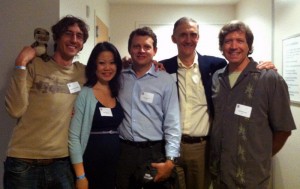
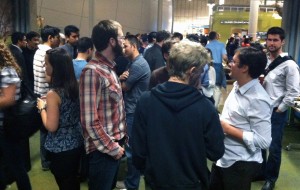
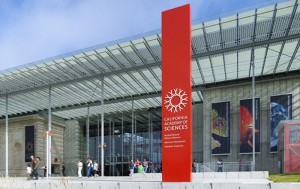 On June 28, more than 100 UW CSE alums joined faculty members Gaetano Borriello, Luis Ceze, Steve Gribble, Dan Grossman, and Ed Lazowska for a reception at the California Academy of Sciences.
On June 28, more than 100 UW CSE alums joined faculty members Gaetano Borriello, Luis Ceze, Steve Gribble, Dan Grossman, and Ed Lazowska for a reception at the California Academy of Sciences.

Bloomberg Businessweek: “Zoran Popović: Recruiting Gamers to Fight Disease”
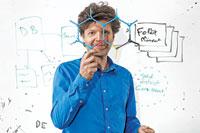 “Proteins are the workhorses of our cells: They turn food into energy and determine our health. Each one is a chain of molecules—sometimes thousands of links long—that folds in a distinctive way. Understanding how they fold can help scientists block diseases, but there are so many variables involved that even powerful computers struggle to do it.
“Proteins are the workhorses of our cells: They turn food into energy and determine our health. Each one is a chain of molecules—sometimes thousands of links long—that folds in a distinctive way. Understanding how they fold can help scientists block diseases, but there are so many variables involved that even powerful computers struggle to do it.
“Enter Zoran Popović.”
Read the post here.
Seattle named “America’s Top Tech Metro” by Richard Florida
 We disavow all rankings except those where we come out smelling like a rose (no matter how implausible it may be).
We disavow all rankings except those where we come out smelling like a rose (no matter how implausible it may be).
Here’s a ranking that’s clearly authoritative: Richard Florida, a senior editor of The Atlantic, Director of the Martin Prosperity Institute at the University of Toronto, and author of Rise of the Creative Class, has released his latest index ranking the top tech hubs in the U.S. And Seattle is #1. (Silicon Valley is #2; San Francisco is #3.)
Read a GeekWire post here. Read the Richard Florida post here. Read more →
Ira Kemelmacher-Shlizerman joins UW CSE
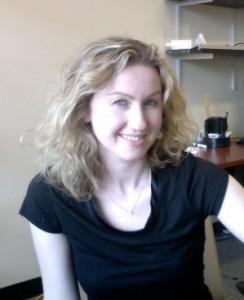 We are thrilled to announce that Ira Kemelmacher-Shlizerman will be joining the UW CSE faculty this fall.
We are thrilled to announce that Ira Kemelmacher-Shlizerman will be joining the UW CSE faculty this fall.
Ira works in computer vision and computer graphics, with a particular interest in developing computational tools to enable capturing, modeling and rendering a person’s appearance and behavior from the billions of photos that can be now found online or in personal photo collections. As a consultant to Google, she transitioned her recent work “Exploring Photobios” into “Face Movie,” the signature feature of the latest release of Picasa. Currently a Postdoctoral researcher in UW CSE, Ira received her B.Sc. with honors in computer science and mathematics at the Bar-Ilan University in 2001 and M.Sc. and Ph.D in computer science and applied mathematics at the Weizmann Institute of Science in 2004 and 2009 respectively.
The addition of Ira and of Ali Farhadi to the UW CSE faculty further enhances our already superb capabilities in computer graphics, computer vision, games, and animation. Here’s what the GRAIL team has accomplished in just the past few years:
Student recognition:
- Three Ph.D. students recognized in the ACM Doctoral Dissertation Award competition in the past six years: Seth Cooper (winner, 2012), Noah Snavely (honorable mention, 2009), and Aseem Agarwala (honorable mention, 2006).
- TR35 awards to Ph.D. alums Noah Snavely (2011), Adrien Treuille (2009), and Karen Liu (2008).
- Sloan Research Fellowships to Noah Snavely (2012), Karen Liu (2010), and Li Zhang (2010). (Li Zhang also received a Packard Fellowship in 2010.)
- Technical Academy Awards to Ph.D. alums Brett Allen and Per Christensen, both in 2010.
Tech transfer:
- Microsoft Photosynth
- Microsoft Group Shot
- Google Picasa Face Movie
- Google Maps Photo Tours
- Electronic Arts continuum crowds and style-based inverse kinematics
- Adobe Photoshop Auto-Align vignette correction
- Adobe Photoshop Elements Photomerge
- Adobe After Effects Roto Brush
- ESPN/NASCAR/Sportvision Draft Track
Breakthrough games for science and for learning:
With the addition of Ira and Ali, there is even more to come! Read more →
Wired: “New Videogame Lets Amateur Researchers Mess with RNA”
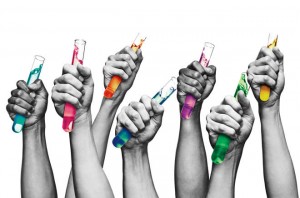 A Wired profile of UW CSE Ph.D. alum Adrien Treuille – now a faculty member at Carnegie Mellon – and his videogame EteRNA, in which players manipulate nucleotides, the fundamental building blocks of RNA, to coax molecules into specific shapes. The work is an outgrowth of the protein folding and protein structure calculation game Foldit, which Adrien developed in the UW Center for Game Science along with fellow student Seth Cooper.
A Wired profile of UW CSE Ph.D. alum Adrien Treuille – now a faculty member at Carnegie Mellon – and his videogame EteRNA, in which players manipulate nucleotides, the fundamental building blocks of RNA, to coax molecules into specific shapes. The work is an outgrowth of the protein folding and protein structure calculation game Foldit, which Adrien developed in the UW Center for Game Science along with fellow student Seth Cooper.
Read this terrific profile here. Read more →
GeekWire: “Love and marriage: How the UW is making bets on the brains of ‘big data’ and ‘machine learning’”
 “Computer science is very much a discipline that revolves around numbers. But it was something a little less mathematical that led to the University of Washington strengthening its computer science department in recent months: Love, marriage and friendship.
“Computer science is very much a discipline that revolves around numbers. But it was something a little less mathematical that led to the University of Washington strengthening its computer science department in recent months: Love, marriage and friendship.
“In no fewer than three separate situations, the UW’s computer science department was able to attract world-class professors in ‘big data,’ ‘machine learning’ and ‘visual data analysis’ by finding work at the UW or other opportunities for their spouses.
“The new hires — including Carlos Guestrin from Carnegie Mellon University, Ben Taskar from the University of Pennsylvania. and Jeff Heer from Stanford University — come as a package deal with equally talented spouses who will be contributing to the UW or Seattle tech community in other ways …
“Ed Lazowska, the Bill & Melinda Gates Chair in Computer Science & Engineering at the University of Washington, said the collection of the new staffers is simply extraordinary. He called Guestrin, Taskar and Heer ‘instant-impact head-turners,’ noting that top computer science programs ‘are salivating’ and wondering how the UW pulled off what amounts to a trifecta … In some cases, the UW was able to beat out competing offers from the likes of MIT, Penn, Stanford and others.
“The top-notch recruiting efforts of UW computer science chair Hank Levy certainly played a role in attracting the scientists, with Lazowska calling his colleague the ‘best recruiter in the country.'”
Read more here. See a related (subsequent) UW press release here. Read more →
Seattle Times: “UW recruits superstars of computer science world”
The Seattle Times reports on UW’s recruiting of four mid-career stars in Machine Learning and “big data” from Carnegie Mellon, Penn and Stanford:
“They’re a kind of dream team of the computer science world: Four of the brightest academics in the fields of “big data” and machine learning have been wooed away from top schools to join the University of Washington over the next year.
“It’s part of a push by the UW to develop expertise in a field of computer science that is already changing the way people use technology. Their work has the potential to greatly expand the ability to make sense of reams of data, gain a better understanding of the world at large, and make technology more useful in everyday life.
“The UW has had ‘some stunning recruiting successes,’ said Peter Lee, corporate vice president of Microsoft Research. The new hires ‘are all very well-known. Let’s just say, in academic circles, this has made quite a buzz.'”
“The academics include Carlos Guestrin, a professor at Carnegie Mellon University; Emily Fox and Ben Taskar, both professors at the University of Pennsylvania; and Jeff Heer, a professor at Stanford University …
“Stanford University professor Daphne Koller, an expert on artificial intelligence, had both Guestrin and Taskar as students, and ‘they are both awesome,’ she wrote via email. ‘UW is to be congratulated on making such great acquisitions, which I believe will propel them into a leadership role (with a select number of other top institutions) in the areas of machine learning and artificial intelligence.'”
Read the article here. See a related (subsequent) UW press release here. Read more →
Will the real Josh Smith please stand up?
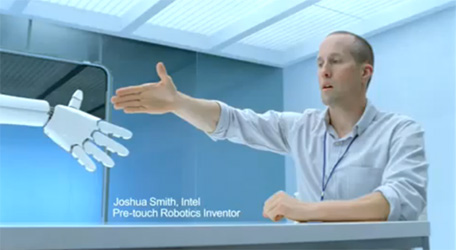 UW CSE and EE professor Josh Smith was featured yesterday as the “Disruptor of the Day” in the Daily Disruption tech blog:
UW CSE and EE professor Josh Smith was featured yesterday as the “Disruptor of the Day” in the Daily Disruption tech blog:
“Sensors are everywhere around us from smartphone touchscreens to elevator buttons to thermostats. These sensor devices, which receive and respond to a signal, are a linchpin of the so-called “Internet of Things.” As they become smaller, cheaper and require less power they are being deployed in more places that we encounter every day — whether we are aware of it or not.
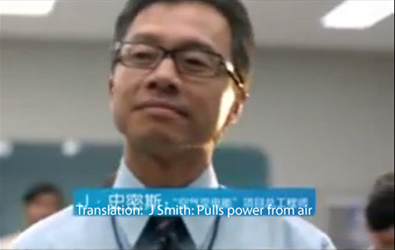 “Joshua Smith is a researcher on the cutting edge of sensor technology. Smith holds nearly 20 patents, including a capacitive sensor he developed as part of his MIT doctoral thesis that detects passenger position for airbags — if the passenger’s head is too close to the side airbag, the sensor will disable it. The technology has been deployed in Hondas since 2000.
“Joshua Smith is a researcher on the cutting edge of sensor technology. Smith holds nearly 20 patents, including a capacitive sensor he developed as part of his MIT doctoral thesis that detects passenger position for airbags — if the passenger’s head is too close to the side airbag, the sensor will disable it. The technology has been deployed in Hondas since 2000.
“Today, Smith leads the Sensor Systems Laboratory and research group at the University of Washington, where he is an associate professor of Computer Science & Engineering and Electrical Engineering. The former principal investigator at Intel Research Seattle, where he led robotics projects, is now focused on inventing sensor systems, devising new ways to power them and developing algorithms for using them.
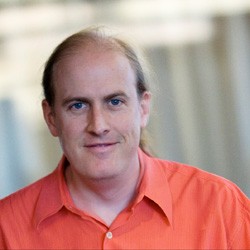 “Recently, Smith discussed the state of sensors, current and future projects, and the concerns that arise as sensors become more commonplace.”
“Recently, Smith discussed the state of sensors, current and future projects, and the concerns that arise as sensors become more commonplace.”
Read the interview here.
Josh’s research was featured in two Intel videos. In each case, though, Josh was played by an actor: in one, by a Chinese gentleman with fuzzy black hair and glasses, and in the other by a Caucasian with a buzz-cut. We conclude that Intel’s PR firm doesn’t like ponytails … Read more →
UW CSE’s Melissa Winstanley: GeekWire’s “Geek of the Week”
 Until today, receiving the 2012 University of Washington President’s Medal as the top student in UW’s 7,500-person senior class was the biggest feather in Melissa Winstanley’s cap. But not any longer! Now she has been named GeekWire‘s “Geek of the Week”!
Until today, receiving the 2012 University of Washington President’s Medal as the top student in UW’s 7,500-person senior class was the biggest feather in Melissa Winstanley’s cap. But not any longer! Now she has been named GeekWire‘s “Geek of the Week”!
This interview is so terrific that you really have to read the whole thing. A few excerpts, though:
“My first computer science class was one I was required to take for another major. I didn’t expect to like it … Within a few weeks, however, I was in love … I enjoyed every minute of the course, so I followed my heart and applied to Computer Science. I have never regretted the choice. I continue to love the mix of problem-solving and real, tangible results. The fact that what I build can affect and benefit people all over the world — whether it’s back-end infrastructure or front-end web design — is incredibly exciting …
“The programmer takes a basic outline — a problem statement, a spec, or a vague idea understandable only by other engineers — and builds a system with meaning. The exact implementation and design is where the creativity emerges. I’ve heard from non-tech friends that they see engineering as an exclusively logical, deterministic field, which is not true at all. The systems that we build can be just as beautiful, well-executed, and meaningful as a piece of music …
“Talk, talk, talk! The conception of the software engineer as an antisocial individual is completely wrong, and the ability to communicate is vital to success in the workplace. Talk is what sells your new idea for a feature; talk fixes conflicts between teams; talk determines the future of the product; talk helps you learn from your peers; and talk ameliorates problems when they inevitably arise …
“If you don’t try it, you don’t know if you like it! I wish I could go back and tell my 18-year-old self to give computer science a chance.”
Please read the rest of this terrific interview here. Thanks to GeekWire‘s Todd Bishop for a great interview and Annie Laurie Malarkey for great photographs. And thanks to Melissa Winstanley for being a phenomenal representative of UW CSE! Read more →
UW CSE alum Paul Javid’s startup Cody in GeekWire
 As a UW CSE undergraduate, Paul Javid spent six months in rural India under the supervision of Ed Lazowska and Tapan Parikh conducting field trials of information and communication technology for developing regions. Subsequently, he received an MBA from Berkeley’s Haas School of Business, and worked at Microsoft. He and Microsoft colleague Pejman Pour-Moezzi are now leading the startup Cody, profiled in GeekWire today:
As a UW CSE undergraduate, Paul Javid spent six months in rural India under the supervision of Ed Lazowska and Tapan Parikh conducting field trials of information and communication technology for developing regions. Subsequently, he received an MBA from Berkeley’s Haas School of Business, and worked at Microsoft. He and Microsoft colleague Pejman Pour-Moezzi are now leading the startup Cody, profiled in GeekWire today:
“Would you take your fitness advice from a robotic looking character named Cody? Some former Microsoft geeks hope so.
“That’s the name of the virtual personal coach that’s designed to get folks off their duffs, and start exercising.
“‘Think of Cody as a proactive Siri. He collects data on your fitness activities, and provides encouragement, recommends activities, and organizes support,’ writes Pejman Pour-Moezzi, the former product manager at Bing who helped come up with the idea.”
Read more here. Read a previous post on the partnership between Javid and Pour-Meozzi here. Read more →

